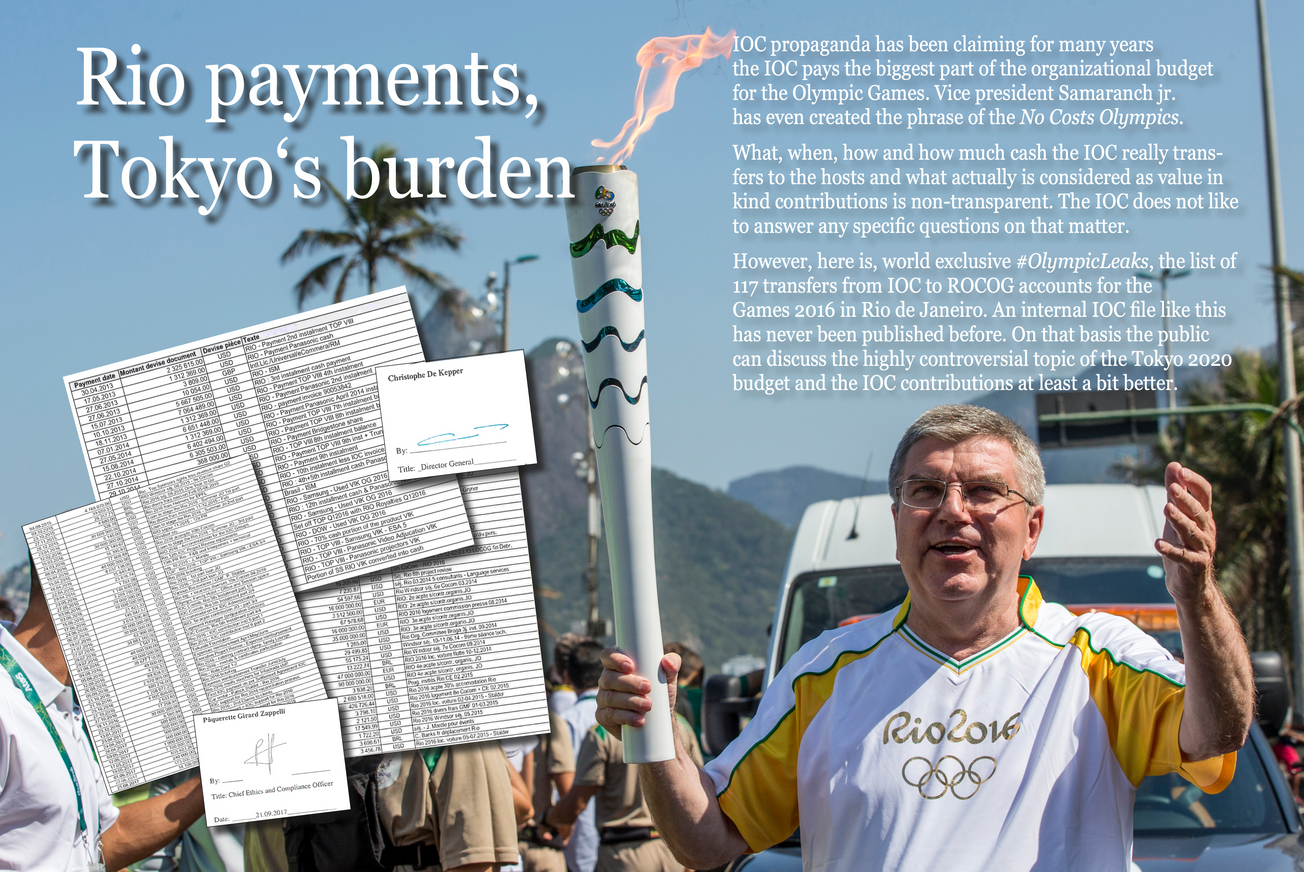The list of all IOC payments for the 2016 Olympics in Rio de Janeiro and what it means for Tokyo
For the first time ever it can be revealed in detail how much cash the IOC paid to an Olympic host. Investigative journalist Jens Weinreich publishes the list of 117 payments to Rio 2016 in a worldwide exclusive in his magazine SPORT & POLITICS.

The revelation helps to understand one of the most fundamental questions around the Olympic movement these days: What kind of contribution can Tokyo 2020 really expect from the IOC?
The Tokyo Olympics 2020 have been moved to 2021 because of the corona pandemic. Even so, the date of the mega-event will continue to be uncertain. If no vaccine is found by early next year at the latest, the Games may be cancelled. The Japanese organisers are already organising their retreat. Resistance is growing rapidly in Japan.
Former prime minister Yoshirō Mori, now president of the Tokyo Organising Committee of the Olympic and Paralympic Games (TOCOG), has announced the Games could not be delayed a further year until 2022 if the pandemic remains a threat in 2021. “In that case, it’s cancelled.”
One day later, at the end of April, the current prime minister Shinzō Abe said in the Japanese parliament that the Games “cannot be held in a complete form if the pandemic is not contained.”
For the time being, however, work continues feverishly in Japan to understand the organisational and financial consequences of the relocation. The additional costs cannot yet be quantified precisely. Initial estimates range between 2 and 6 billion USD. Meanwhile some serious diplomatic tensions have appeared between the International Olympic Committee (IOC) and the Japanese hosts about the burden of additional costs.
IOC president Thomas Bach said:
“The IOC will continue to be responsible for its share of the operational burden and its share of the costs for these postponed Games, under the terms of the existing agreement for 2020 that we have with our Japanese partners and friends.”
On 29 April Bach was quoted on the IOC’s website: “Although it is too early to give an exact figure, we already know that we have to shoulder several hundred million US dollars of postponement costs”.
Meanwhile huge financial and organizational concerns are also being raised about the Games in Paris 2024 and the Winter Games 2026 in Milano, a city severely affected by the Corona virus. If no vaccine is found by next year, the Winter Games 2022 in Beijing are also at risk.
Thomas Bach did not specifically describe which „postponement costs“ he was talking about. He did not mention TOCOG with its 5.6 billion USD organising budget (usually called OCOG budget) and the 7 billion “other entities budget” (usually called Non-OCOG budget).
It is important to be precise here. Bach was only talking about “postponement costs” in general. That would also include additional costs for the IOC itself, for the 33 International Federations in the Tokyo programme and the 206 National Olympic Committees (NOC).
Current host contract without figures
“The Games finance themselves” is the slogan of the Paris 2024 Olympics. That fits one hundred percent with the official IOC assertion: no public money is needed for the organising budget. IOC vice president Juan Antonio Samaranch, son of the former president and responsible for the Beijing 2022 Olympics, has even coined the phrase “No Costs Olympics” in late 2018.
So, what can Tokyo expect from the IOC?
In fact, the published version of the Host City Contract (HCC) for Tokyo 2020 does not include a single figure on the contribution of the IOC. The contract has been signed by the IOC, the Japanese Olympic Committee (JOC) and the City of Tokyo whereas the Japanese government is not even an IOC business partner according to the contract.
In the current fourth version of the OCOG budget, the IOC contribution is listed with a total of 1.3 billion USD: 800 million USD as a share of IOC’s worldwide TV revenue, and 500 million USD as a share of the IOC’s worldwide sponsorship program known as The Olympic Partners (TOP).
However, it all depends on the successful staging of the Games. If the Games are cancelled, most of the money that has already been transferred to TOCOG, will most likely have to be repaid to the IOC.
But even if the Games are held successfully, in theory Tokyo may receive nothing at all from the IOC. The contract stipulates under point 14:
“The IOC shall be under no binding obligation of any kind towards the OCOG or any third party to grant any IOC contribution. The IOC will be entirely free to decide, at its sole discretion, and based upon criteria and factors entirely of its own selection and determination, whether or not to grant any such IOC contribution.“
No binding obligation. Entirely free. Sole discretion. Own selection.
The Host City Contract for the Tokyo Games is based on an old and partly outdated contract model. For future games, the contracts have been revised by the IOC after being heavily criticized worldwide.
There are better contracts in place for the next Olympic organisers – for the Games 2022 (Beijing), 2024 (Paris), 2026 (Milano/Cortina d’Ampezzo), and 2028 in Los Angeles. All these contracts now include four fixed amounts as the “contribution of the IOC to the success of the Games”: The sponsorship share, the TV revenue share, the production of the Olympic TV broadcast conducted by IOC’s own company OBS (Olympic Broadcasting Services), and the so-called transfer of knowledge activities.
The latter means: IOC provides the template, the formula for the Games. The IOC provides big data, experts, knowledge including their respective commissions dealing with the organisers. The IOC sets an estimated value for this.
For Paris 2024, for example, the value of the transfer of knowledge is estimated to be 116 million USD. IOC’s other promises for the Summer Games in 2024 are 855 million as a TV revenue share and 430 million from TOP sponsorship revenue. According to the IOC the Olympic broadcast production via OBS will cost 319 million.
This is the future. And even the Paris Olympics is doubtful.
But Tokyo is the present.
And there are no obligations and no fixed amounts in the Host City Contract going to the organisers.
Quite the opposite. The only amounts fixed in the HCC to be paid are the monies the IOC is to receive from Tokyo organisers.
This fact is widely ignored in the public discussions about the Tokyo costs.
IOC is certain to receive money from Tokyo
At this point the HCC is clear and strict. TOCOG has to pay to the IOC:
- 7.5 percent of all cash payments from domestic sponsorship and suppliers.
- 5 percent of those domestic sponsorship contracts if delivered as Value in Kind (VIK) by the sponsors. In that case TOCOG has to convert VIK in cash and has to transfer the amounts to IOC’s accounts.
- 7.5 percent of the ticketing and domestic hospitality revenue.
- Additionally, some minor parts: 3 percent of the revenue of the coin program and 1 percent of the stamp program.
According to the current budget, TOCOG claims domestic sponsorship revenues of 3.3 billion USD – which would be an all time record for the Olympics – and ticketing and hospitality revenues of 800 million USD.
That means TOCOG has to transfer roughly 250 million USD to the IOC.
There is the binding 250 million USD Tokyo payments – and there is the non-binding IOC contributions of 1.3 billion USD. It comes to a net amount of a bit more than one billion the IOC has to transfer to TOCOG.
Now it’s getting more complicated – and exclusive.





